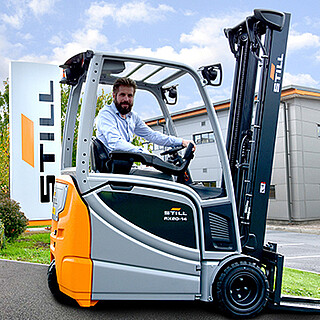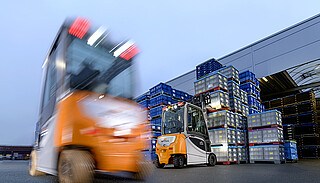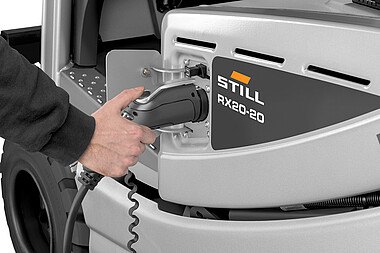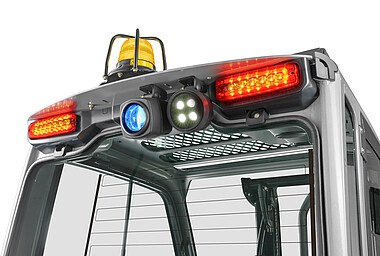Electric forklifts vs IC engine forklifts, why make the switch?

An interview with Torsten Wiecker - MD of STILL UK
As the electric forklift truck market continues to grow in the UK, should we all make the switch to electric counterbalance forklifts? How do they compare in performance to their IC (Internal Combustion) engine rivals? And what does “electric” mean for the materials handling industry as a whole? Are lower carbon emissions the only benefits that green logistics can bring for business? In this interview with Torsten Wiecker, Managing Director of STILL UK, we answer the key questions around electric forklift trucks and their benefits.
Electric counterbalance trucks vs IC engine trucks – What do the tests show?
Over the past 20 years, I’ve seen a progressive uptake and improvement in the electric forklift truck market, back then there was a technological switch where electric was first considered as a viable alternative to IC engine trucks.
Today, we are in a position where electric not only offers cost savings when compared to IC, but STILL E-trucks can now operate on a higher performance level when directly compared to IC engine machines.

Following various independent tests carried out in Germany, one in 2018 and one in 2020 the STILL RX 20 electric counterbalance forklift (1.4 - 2.0 tons) was deemed: "the best forklift ever tested at the Verkehrsrundschau." On both occasions, the forklifts were assessed across several different criteria such as performance, safety, comfort and quality – and the results were exceptional on all levels. “We achieved an arithmetical output of 430 pallets per eight hours. This means that the RX 20 surpasses the highest recorded pallets per hour within this class.” (f+H Staplertest).
In addition, the below video compares STILL's slightly larger electric counterbalance forklift (the RX 60 2.5-3.5 tons) with several IC engine forklifts (of different makes and the same capacity). The RX 60 is not only their equivalent in terms of power... it even surpasses them in terms of performance! It was reported that: “for the first time in 31 years an electric forklift scores a higher productivity than an IC engine forklift.” These are incredible results which clearly show the electric forklift outperforming its IC powered rival.
What are the benefits of an electric forklift?
The obvious benefit for switching to an electric forklift from diesel or LPG, is helping the environment and reducing your operational carbon footprint. Beyond that, the other benefits are performance, application, lower maintenance and operating costs, plus quieter, cleaner working environments for your staff.
In terms of performance electric forklift trucks last longer and consume less than IC engine trucks! For example, our new RX 60 (3.5-5.0 tons) will manage up to two complete shifts without needing to recharge.
E-trucks have a more diverse application than IC forklift trucks and can be used indoors and outdoors with no impact to their overall performance. For Fleet Managers this creates the potential to condense their vehicle fleets with a more versatile truck.
Electric forklift trucks are highly affordable with considerably lower operating costs than LPG or diesel forklifts. The working environment is important for the health of your forklift operators and warehouse staff. So, with zero emissions, a near silent operation and no emissions regulations to worry about, electric forklifts are safer and easier to live with.
Do electric forklifts have a lower cost of ownership?
For STILL customers the cost of ownership is as important as the performance of the vehicle itself, the less you're paying over the entire lifetime of the forklift, the greater the financial saving.
And here is where electric forklifts offer a clear advantage; depending on the customer’s application, the Fleet Manager will see much lower servicing costs. This is due to electric vehicles having far fewer parts, and with no engine or exhaust system there is far less maintenance required. As a result, the service work will be less, which will bring down the total cost of ownership over time.
Do electric forklifts improve logistics health and safety?
Absolutely. E-trucks produce no emissions and have a safe and quick battery change with our unique ‘lateral’ exchange. With our latest RX 20 (1.4-2.0 tons) there is the new communication centre for safety and handling performance (STILL Easy Control). The driver can activate performance functions (depending on the application) and will receive all the important safety updates straight away.
For many years STILL has built its forklifts with a ‘safety-first’ mentality, and all our electric machines are built with unique safety features readily available for our customers. Features such as the Blue SafetyLight which alerts others that the forklift is approaching. Plus, optional technical features that limit the speed automatically, depending on if its operating inside or outside.
Will the materials handling industry become completely electric soon?
It will certainly become more electric, yes. Whether it will completely switch to 100% electric, we will have to see. In the UK market alone, we have already seen the sales volumes of electric counterbalance forklifts double between 2009 and 2017…and the market is continuing to grow at a high rate.
This is similar to other European countries, however, there are still many applications where IC engine trucks need to be used. In my mind, I also believe that fuel cell technology will become more important in the upcoming years.
Will materials handling see the same shift as the automotive industry?
With disruptors like Tesla entering the market?
I think the forklift industry is ahead of the automotive industry. In 1946, STILL presented the first electric cart (EK 2000) so as a company we already have 74 years’ experience in this field.
For the past 20 years, sales of electric forklifts have increased with more companies investing in electric. So, the time for market disruption (like we have seen in automotive by Tesla) has been and gone.
How has the electric forklifts market changed the logistics industry?
In Europe, over the last 20 years the volume of electric forklifts has increased compared to the IC engine (diesel and LPG) market. In most European markets we have even seen that more electric forklifts are sold than IC machines, so much so, that by the end of September 2020 (in Europe alone) a third more electric forklifts were sold compared to IC.
I believe this shift in demand is driven by better technology and the ‘lateral battery change’ developed by STILL. As already mentioned, our new RX 60 demonstrates a stronger performance than comparable IC engine forklifts.
The UK is different to other markets in Europe. However, our customers are beginning to see the advantages of electric trucks and the market is really starting to grow. Fortunately, the UK Government is continuing to invest and supports the broader acceptance of electric cars, meaning the “electric” network infrastructure is steadily being improved.
It’s also worth bearing in mind that the regulations for diesel and gas powered forklifts are getting tougher as governments clamp down on emissions. As a result, IC forklifts will become more expensive and when you add in the maintenance costs, the electric forklift not only improves your carbon footprint; but they have a much lower total cost of ownership.
How can businesses switch to ‘greener’ warehousing?
There are several ways in which businesses can make green improvements to their intralogistics operations.
Firstly, ensure you maximise the usage rate of your existing forklift trucks. This can be supported with specialist Fleet Management tools or Material Management Systems. Next, consider using your existing space more effectively where possible, and switch to a VNA (very-narrow-aisle) system if possible.
And of course, increase the use of electric forklift trucks where possible! It’s important to remember all these improvements aren’t just for environmental purposes, they help improve the efficiency of your operation and help save money too.
Are there any ‘green’ warehousing examples from STILL's customers?
We have a number of customers in the UK who take the ‘green’ agenda and carbon footprint very seriously and so opt to use entirely electric fleets, but there are of course some, who choose to have mixed fleets because it suits their type of application.
On a global level, we support brands such as: Coca-Cola, Michelin, Jägermeister and we even have a STILL electric truck operating in the Vatican!

What benefits can ‘green’ logistics pass on to businesses?
I strongly believe that we, as a society and as individuals must act sustainably. E-trucks produce zero emissions, no noise pollution and the total cost of ownership is much lower compared to that of IC engine forklifts.
UK business owners will also be familiar with the carbon tax, with our customers they have an agenda to reduce their carbon footprint and operate more sustainably. I am pleased that STILL (as their forklift supplier) can help them achieve their goals by switching to electric. So ‘green logistics’ is not only sustainable, it also reduces the cost for our customers.
Comments
No comments
Subscribe to the blog !
Be informed as soon as an article is published. You can unsubscribe anytime.



Leave a comment